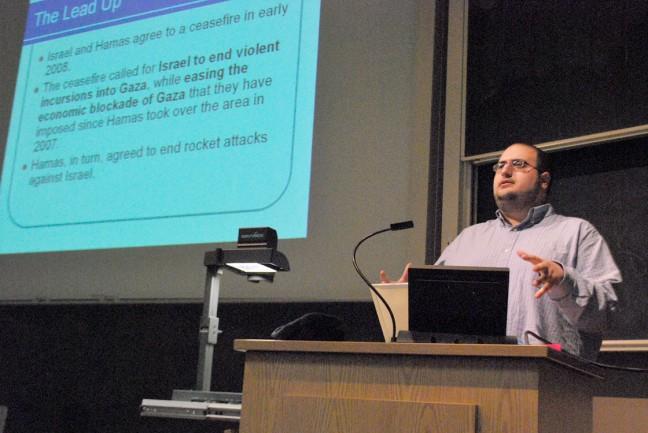That is until one day when she witnessed the bombing of a police station outside her school that resulted in the brutal deaths of around 200 citizens.
For months after, she spent her nights lying awake, trembling, according to a close family friend, University of Wisconsin Middle East studies professor Jennifer Loewenstein.
The extent of the brutality to innocent civilians throughout Gaza was one of the focal points in a discussion by UW students and other community members Tuesday.
Hosted by several activist groups and organizations, the Gaza invasion discussion panel was part of a weeklong series of events on campus to raise awareness and educate UW students on the Israel and Gaza conflict by giving them a chance to speak with people directly involved and affected.
“As a student, I’m very close to those who came here because I have classes with them and share experiences, so there is a little bit of a bridge there to convey our message,” former Gaza resident and current UW junior Jehad Algharabli said.
Loewenstein said Americans do not receive full and unbiased coverage of the events in Gaza, adding very few journalists are even allowed into the area to report and film.
“People in the Middle Eastern world and the Muslim world are seeing footage Americans never see that is glossed over in mainstream presses,” Loewenstein said. “Western journalists and media here decide what to keep and what to edit, meaning Americans never see the terror or the true experiences of those in the Palestinian territories.”
Algharabli, who gets his news updates from his father who still lives in Gaza as opposed to American news sources, said he feels the truth of the conditions needs to be publicized.
However, he emphasized Americans are not simply ignoring Israel’s ongoing attacks on civilians.
Some of the “glossed over” facts Algharabli and Loewenstein spoke of include that 70 to 80 percent of children in Gaza suffer from post dramatic stress disorder from the constant bombings surrounding the area, along with malnutrition, fear, anxiety and depression.
Student Progressive Dane member Samir Jaber said the panel discussion was important to educate students who have the chance to become the future leaders and decision makers in the world about what is going on in the Palestinian territories and what they can do to help and prevent these acts.
“The first thing everyone can do is step back and participate in programs to learn a little bit more about the conflict and explore other opinions to realize what the American media tells you isn’t necessarily true,” Jaber said.







